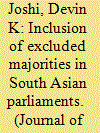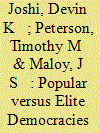|
|
|
Sort Order |
|
|
|
Items / Page
|
|
|
|
|
|
|
| Srl | Item |
| 1 |
ID:
138123


|
|
|
|
|
| Summary/Abstract |
This article provides a new perspective on parliamentary representation in South Asia, focusing on the collective under-representation of population majorities based on the macro-demographic categories of age, class, and gender. Situating this analysis within debates on descriptive representation, it presents the first comparative analysis of the contemporary demographic characteristics of members of parliament (MPs) in Bangladesh, Bhutan, India, Nepal, Pakistan, and Sri Lanka. Highlighting three major gaps in parliamentary representation, it finds quotas, proportional representation electoral systems, and leftist parties to have positively impacted the descriptive representation of South Asian women, the working class, and young adults.
|
|
|
|
|
|
|
|
|
|
|
|
|
|
|
|
| 2 |
ID:
165438


|
|
|
|
|
| Summary/Abstract |
Scholarly research generally finds that democratic governments are more likely to respect human rights than other types of regimes. Different human rights practices among long-standing and affluent democracies therefore present a puzzle. Drawing from democratic theory and comparative institutional studies, we argue more inclusive or “popular” democracies should enforce human rights better than more exclusive or “elite” democracies, even in the face of security threats from armed conflict. Instead of relying on the Freedom House or Polity indexes to distinguish levels of democracy, we adopt a more focused approach to measuring structures of inclusion, the Institutional Democracy Index (IDI), which captures meaningful differences in how electoral and other institutions channel popular influence over policy-making. Analyzing levels of physical integrity rights through a time-series cross-sectional research design of forty-nine established democracies, supplemented by structured case comparisons, reveals a significant and robust relationship between more inclusive democratic institutions and better respect for human rights.
|
|
|
|
|
|
|
|
|
|
|
|
|
|
|
|
| 3 |
ID:
153395


|
|
|
|
|
| Summary/Abstract |
There has been much speculation about whether China will democratize and avoid conflict with India in the twenty-first century. Yet, few studies have investigated how contemporary Chinese view India and its democracy. Addressing this gap in the literature, the authors examined Chinese media coverage of India’s two-month long April–May 2014 parliamentary election, the largest election in world history, through systematic analysis of over 500 articles from ten major mass media outlets and over 27,000 messages transmitted on Sina Weibo social media. As might be expected, Chinese mass media generally portrayed India and its elections in a condescending fashion while avoiding discussion of ‘democracy’. However, the authors found a much broader array of viewpoints on Chinese social media including considerable praise for Indian Prime Minister Narendra Modi and extensive discussion about the intrinsic and instrumental merits of democracy both in India and in general.
|
|
|
|
|
|
|
|
|
|
|
|
|
|
|
|
|
|
|
|
|